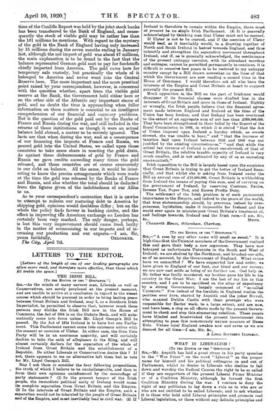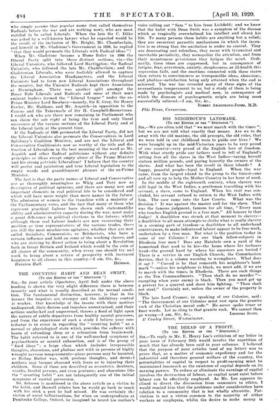WHAT IS LIBERALISM ?
[To ism Renee or THE--" SPECIATOR."] Sea, Mr. Asquith has laid a great stress in his party speeches to the " Wee Frees" on the word "Liberal " as the proper name for himself and his political colleagues in and out of Parliament, whilst he denies to Liberals who decline to fall down and worship the Radical Caucus the right to be so called if they are supporters of the present Liberal Prime Minister or of a Coalition Ministry, although he formed the first Coalition Ministry during the war. I venture to deny the right of any politician to lay down a rule as to who are or who are not entitled to be called Liberals, and to ask whether it is those who hold solid Liberal principles and promote real Liberal legislation, or those without any definite principles and
who simply assume that popular name (but called themselves Radicals before the war and are nothing now), who are most entitled to be called Liberals. When the late Sir C. Dllke was asked by a well-known lawyer what he expected would be the result of the inclusien of Mr. Bright, Mr. Chamberlain, and himself in Mr. Gladstone's Government in 1880, he replied "that they would permeate the Liberals with Radical ideas"!
When Mr. Gladstone became a Home Ruler in 1886 the Liberal Party split into three distinct sections, viz.—the LibCral Unionists, who followed Lord Hartisgton; the Radical Unionists, who followed the late Mr. Chamberlain; and the Gladstonian Liberals, who were foolishly allowed to capture the Liberal Association Headquarters, and the Liberal Unionists had to form new Liberal ASsoCiations throughout the country, but the Unionist Radicals kept their Association at Birmingham. There was another split amongst the Home Rule Liberals and Radicals and some of their most eminent leaders formed the " Liberal League" under the ex- Prime Minister Lord Rosebery—namely, Sir E. Grey, Sir Henry Fowler, Mr. Haldane, and Mr. Asquith—in opposition to the Caucus and the Tabernacle of Sir H. Campbell-Bannerman. I would ask who are there now remaining in Parliament who can claim the sole right of being the true and only lineal successors of the various sections of the Liberal Party and of the Liberal faith at the present time.
If the Radicals of 1880 permeated the Liberal Party, did not the Liberal Unionists also permeate the Conservatives in Lord Salisbury's Coalition Ministry, and are not the Liberal and Conservative Coalitionists now as worthy of the title and dis- tinction of Liberalism in the best meaning of the word as Mr. AsqUith and other Radical politicians without any definite principles or ideas except empty abuse of The Prime Minister and his strong patriotic Liberalism? I believe that the country will prefer real patriotism and true Liberal legislation to the empty words and grandiloquent phrases of the ex-Prime Minister.
The fact is that the party names of Liberal and Conservative are as thoroughly meaningless as Whig and Tory now as descriptive of political opinions, and there are many new and important elements in real political life to be considered and which will have more weight than mere names in the future. The admission of women to the franchise with a majority of the Parliamentary votes, and the fact that many of those who represent practical Labour have shown such statesmanlike ability and administrative capacity during the war, must make a great difference in political elections in the future; whilst although these real Labour leaders are now recovering their position as true representatives of the various trades, there are still the most mischievous agitators, whether they are now called Socialists, Communists, or Bolshevists, who have a certain influence and hold on some of the working classes, and who are striving by direct action to bring about a Revolution both in Great Britain and Ireland which would he the ruin of ill classes of the community, when every one should try and work to bring about a return of prosperity with increased happiness to all classes in this country.—I am, Sir, &c.,



































 Previous page
Previous page